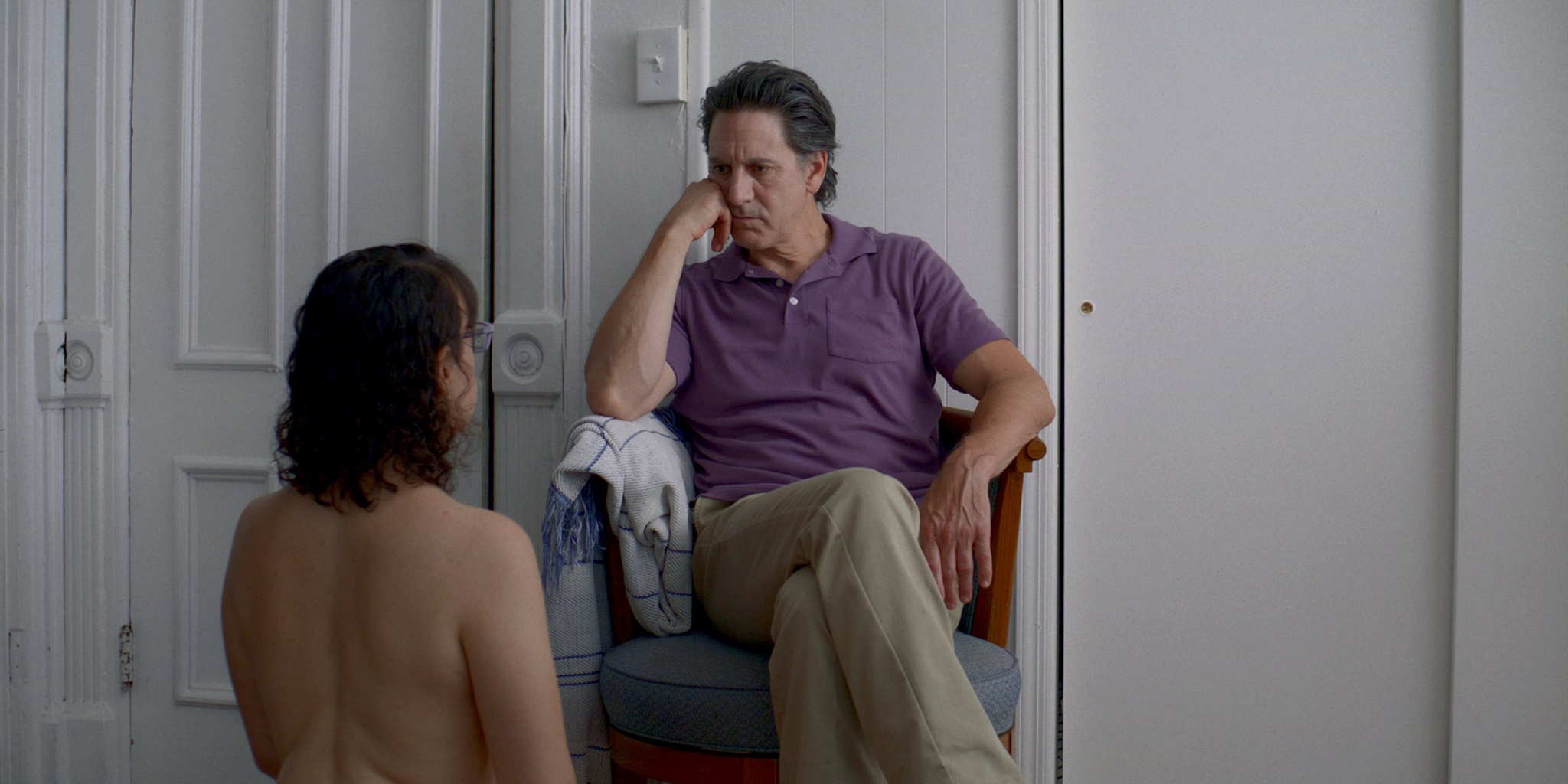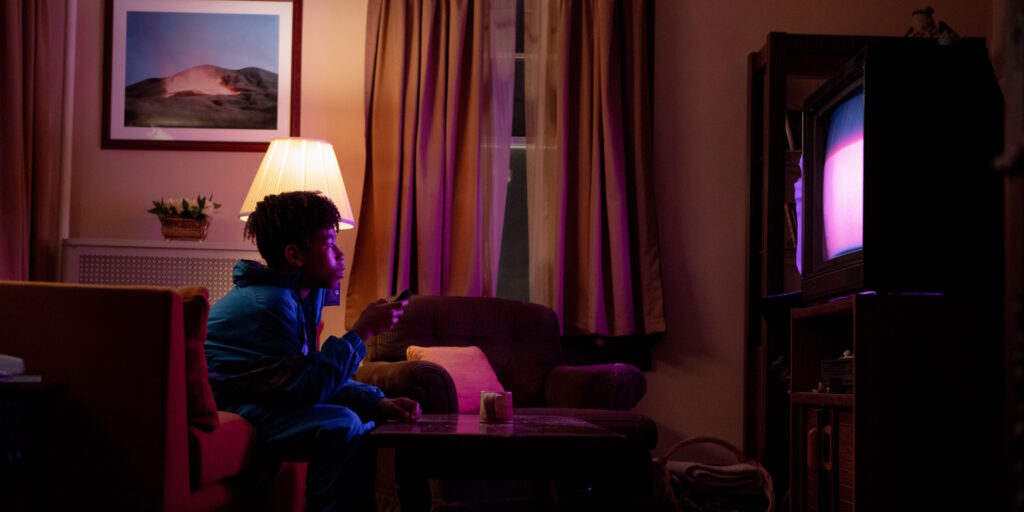Brooklyn millennial Ann (Joanna Arnow) is drifting in the doldrums of her own life. She works a vague, soul-numbing corporate job, the sort of environment where a clueless fiftysomething manager stands up in a meeting and declares, “If you’re not on Spotify, you’re behind the times.” She hails from a close-knit Jewish family, but a minute or two with her passive-aggressive, low-key narcissistic mother (Barbara Weiserbs) is sufficient to understand why she might prefer solitude. She seems to have a handful of hip New York friends, but they mingle namelessly at the margins of her daily routine. She goes to her yoga classes, eats her microwaved meals, and wakes up to do it all over again. When her older sister crashes with her during a rough patch in her marriage, she looks around Ann’s apartment and observes with a note of pity, “You don’t have anything hanging on your walls.”
The only stimulating things in Ann’s otherwise stiflingly beige life are her sexual relationships, which are both emotionally distant and unapologetically kinky. First among several partners is her long-term “master,” Allen (Scott Cohen), an older man she has been seeing for nearly a decade. He barks idiosyncratic orders at her – “Stand against the wall. Now suck on my nipple. Now stand against the wall.” – and she silently complies with a practiced deference. He is obsessive yet self-absorbed, unable (or perhaps unwilling) to recall the basic facts of Ann’s life. It’s ambiguous whether his disinterest in engaging with her as a person is just a part of their mutual agreement. Ann insists that his negligence toward her own sexual pleasure is a turn-on, but she certainly seems dissatisfied on some level. When he video-calls her in the wee hours to demand some on-screen exhibitionism, she harrumphs that she is not a browser window to be clicked to satisfy his compulsions.
Although the peculiarities of Ann and Allen’s BDSM encounters might be a bit confounding to more vanilla-minded viewers, it’s obvious why she might prefer a relationship with a clearly defined role. Ann is in limbo, sleepwalking through a life that feels airless, colorless, and directionless. The term “existential crisis” implies an urgency that is wholly absent, but there’s an unmistakable sense that she has no idea who she is or where she’s going. When she is kneeling naked in front of Allen, waiting patiently to give him a blowjob on command, she at least has an identity, however debasing it might be. The same goes for her relationships with an assortment of other dominant men she meets online, such as Elliott (Parish Bradley), who orders her to don a ball gag and “Fuck Pig” costume and then masturbate in full view of passing subway riders. To be a Fuck Pig is to have one’s duties clearly defined. Meanwhile, at the office, Ann and her employer can’t even agree on her job title.
The logorrheic title of Ann’s story, The Feeling That the Time for Doing Something Has Passed, feels like it should be read with a sigh of numb despair. The feature’s frank (and often funny) sex scenes and Arnow’s fearless approach to nudity – she is in various stages of undress for roughly half the film – might lure in kink-curious viewers, but the depiction of BDSM culture is more substrate than subject. The tragicomedy of being a thirtysomething with no particular plans for the future is what interests Arnow, who is not only the film’s star but also its director, writer, and editor. The de-glamorized, de-sensationalized way that The Feeling portrays consensual kink is part of the film’s slouchy appeal, but it’s not really the star attraction.
Ann would probably deny that she is an unhappy person, but the tasteless simplicity of her existence – outside of her exotic sexual preferences – is not depicted as some aspirational, Thoreau-like minimalism (a la Jim Jarmusch’s Paterson). There’s a mingled air of self-aware complacency and glum acceptance in her demeanor, whether she’s sitting on an insipid video conference with HR, vainly attempting to sustain a limp conversation with her parents, or submitting to ritualized spanking discipline with one of her partners. It’s as if she is keeping her gaze determinedly downcast, on the off chance that the universe might send her a sign that something needs to change. When a nice, ordinary guy (Babak Tafti) eventually enters her life through more mainstream dating channels, the excitement of something new is in tension with her habit of quietly self-sabotaging any opportunity for real intimacy.
Arnow is an indie-scene multi-hyphenate who has previously directed short films (“Bad at Dancing”) and a documentary about her relationship with cultural provocateur Max Karson (I hate myself 🙂). The Feeling is her narrative feature debut, and it exhibits the sharply defined comedic voice of a filmmaker who has been honing her talents and waiting for her moment. Although there’s a familiar strain of New York Jewish self-loathing to the film’s wit, Arnow’s approach is more narcotic than neurotic. The actors deliver her dialogue in a deadpan manner that isn’t totally affectless, leaving room for the contempt, apathy, and disappointment to bleed through. Rather than fill the air with anxious chatter, Arnow allows her screenplay’s awkward pauses (so, so many awkward pauses) to swell into silent voids of internal laughing, sobbing, and screaming.
Critical comparisons to Lena Dunham – particularly her breakout feature, Tiny Furniture (2010) – feel inevitable here, but Arnow’s comedic style is more indebted to the deadpan work of Noah Baumbach, Harmony Korine, and Riley Stearns. However, The Feeling most closely recalls the bone-dry Scandinavian sensibility of Aki Kaurismäki (The Match Factory Girl) and Roy Andersson (Songs from the Second Floor). The latter in particular, as Arnow’s fantastic editing slices and dices her protagonist’s routine into a cavalcade of cringy vignettes, some as brief as a single line of dialogue. The effect is at once flatly objective and startlingly impressionistic, conveying the absurdities and indignities of Ann’s day-to-day existence with an unusual parsimony.
Admittedly, the poker-faced black humor of The Feeling won’t be to every viewer’s taste. The effectiveness of this stripe of urban-millennial dramedy partly depends on the familiarity of its situations, characters, and general mood of free-floating ennui. You don’t have to have an exhausting, perpetually disappointed Jewish mother to chuckle uncomfortably at Arnow’s film, but it undoubtedly cuts deeper if you do. (A mother-daughter exchange about a banana is one of the film’s agonizing highlights, but it’s hard to explain exactly why it’s funny.) Although The Feeling is the sort of lightweight character piece that prioritizes depiction over psychological insight, Arnow’s filmmaking is so distinctive, exacting, and confident that there is masochistic pleasure to be had just in vibing with Ann’s sad little life.
The Feeling That the Time for Doing Something Has Passed is now playing in select theaters.




